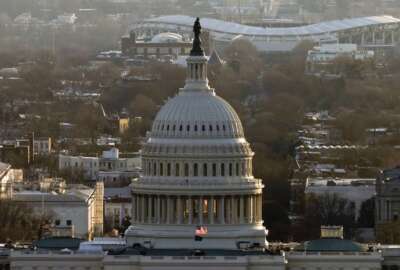Congress faces agenda of unfinished business
Averting sequestration sits atop the to-do as Congress returns Tuesday from a seven-week election break to a long list of unfinished business.
By DONNA CASSATA Associated Press
WASHINGTON (AP) Sequestration and the budget top the list as Congress returns Tuesday from a seven-week election break to a long list of unfinished business.
Looming large in the lame-duck session is the urgent need for President Barack Obama and Congress to figure out how to avoid the double economic hit of tax increases and automatic spending cuts to defense and domestic programs that kick in after Jan. 1. Those high-stakes negotiations could take weeks and the issue may not be resolved by year’s end.
In the interim, Democrats and Republicans are picking up where they left off on several bills while welcoming the newest members — 12 in the Senate and some 70 in the House — for Congress’ version of freshmen orientation.
While the nation’s voters endorsed the status quo of divided government — a Democratic president and Senate, a Republican House — Obama cruised to re-election and his emboldened party gained seats in both the House and Senate. In the new political order, Democrats will hold a 55-45 edge in the Senate if independent Angus King of Maine caucuses with them as expected. Republicans’ advantage in the House narrowed and is likely to stand at 233-201.
Democrats were leading in the six undecided House races in Arizona, California, Florida, North Carolina and Utah.
The question over the next seven weeks is whether Obama and Congress can agree now or later on how to slash $1.2 trillion from the deficit, raise revenues with possible changes in the tax code and address the entitlement programs of Social Security and Medicare. They also have to figure out how to stop across-the-board cuts to defense and domestic programs totaling $110 billion next year.
Obama meets with congressional leaders at the White House on Friday. Democrats and Republicans recognize the urgency, but the demands remain unchanged.
"If our Republican counterparts can step forward with that revenue piece, we will be able to find a solution," Sen. Patty Murray, D-Wash., said Sunday on ABC’s "This Week." "We can’t accept an unfair deal that piles on the middle class and tell them they have to support it. We have to make sure that the wealthiest Americans pay their fair share."
The GOP insists that tax rate increases are a non-starter.
"There’s a right way to do this and there’s a wrong way to do it," Sen. Saxby Chambliss, R-Ga., said Sunday.
House Speaker John Boehner, R-Ohio, has signaled that a solution is imperative.
"2013 should be the year we begin to solve our debt through tax reform and entitlement reform," he told reporters last week.
Legislation setting defense budgets remains undone, and the House and Senate Armed Services committees were working informally in recent weeks on a bipartisan bill that both chambers could pass.
The House approved legislation months ago, but the Senate hasn’t acted. The freestanding Senate bill has attracted more than 70 amendments and Majority Leader Harry Reid, D-Nev., is pressing for a time agreement that would limit amendments.
Republicans and Democrats will meet Wednesday morning in the Senate to decide leadership jobs, with Sen. John Cornyn, R-Texas, expected to move up to the GOP’s No. 2 spot, replacing Sen. Jon Kyl, R-Ariz., who is retiring.
In the House, Reps. Cathy McMorris Rodgers, R-Wash., and Rep. Tom Price, R-Ga., are vying for the No. 4 job.
The biggest question in the House ranks is whether Minority Leader Nancy Pelosi, D-Calif., remains in her leadership job.
The Senate has scheduled an early evening procedural vote Tuesday for a sportsmen’s bill that will decide the fate of 41 polar bear carcasses that hunters want to bring home from Canada as big-game trophies. Hunters killed the bears just before a 2008 ban on polar bear trophy imports took effect, but were not able to bring them home before the Fish and Wildlife Services listed them as a threatened species.
The House on Tuesday is expected to pass and send to the president legislation that would exclude U.S. airlines from the requirements on emissions that the European Union has sought to impose on all planes flying to and from the European continent.
The House vote comes a day after the EU proposed a one-year freeze on the carbon emissions charges for non-European airlines. The emissions program has met strong opposition from airlines and governments outside Europe, including the United States, China and India.
The Air Line Pilots Association said Monday that even with the temporary delay Congress needs to act to ensure that U.S. airlines are not liable in the future for the EU-imposed tax. It said the cap-and-trade program could cost U.S. carriers $3.1 billion over 10 years.
Crucial in the House this week is passage of legislation that would end Cold War trade restrictions so U.S. exporters can take advantage of the lowered tariffs and greater market access that accompany Russia’s entry into the World Trade Organization. Russia officially joined the WTO in August and the United States is alone among more than 150 WTO members in not being able to enjoy the more open Russian market.
The measure has been a top priority of U.S. business groups seeking to expand business in the growing Russian economy. To placate critics of Russia’s poor human rights record, the trade bill is combined with legislation that would sanction Russian officials involved in human rights violations.
The sportsmen’s bill combines 19 measures favorable to outdoorsmen, allowing more hunting and fishing on federal lands, letting bow hunters cross federal land where hunting isn’t allowed and encouraging federal land agencies to cooperate with state and local authorities to maintain shooting ranges.
A five-year farm bill passed by the Senate and by a House committee last summer will either have to be extended into next year or passed in the remaining weeks of the session. The 2008 farm bill expired Sept. 30.
The bill’s only real chance for passage is if lawmakers decide to use its savings as part of negotiations on the so-called "fiscal cliff." The Senate bill would save $23 billion over 10 years and the House Agriculture Committee bill would save $35 billion over 10 years.
Otherwise, the bill will be extended into next year. Some Republicans have suggested a yearlong extension, but farm-state members and farm groups have said they would prefer a shorter extension to keep the pressure on for passage.
Though much of the work was done on the bill this year, it stalled this fall because of disagreements over food stamp spending. House leaders refused to bring the bill to the floor before the election, saying it didn’t have enough votes.
Republicans have internally disagreed over cuts to food stamps, which make up about 80 percent of the half-trillion-dollar bill’s cost over five years. The Senate bill would cut about $400 million a year out of the program’s almost $80 billion annual cost while the House bill would cut about $1.6 billion from food stamps annually. Conservatives have said neither version makes deep enough cuts.
___
Associated Press writers Jim Abrams and Mary Clare Jalonick contributed to this report.
(Copyright 2012 The Associated Press. All rights reserved. This material may not be published, broadcast, rewritten or redistributed.)
Copyright © 2025 Federal News Network. All rights reserved. This website is not intended for users located within the European Economic Area.





